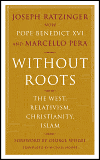| Welcome to Bill's Book Club! Each month, Bill selects a book that he's
been reading and passes it on to you. See what others have to say about the
book, and then let everyone know what you think! |
|
 Without Roots: The West, Relativism, Christianity, Islam Without Roots: The West, Relativism, Christianity, Islam
by Joseph Ratzinger & Marcello Pera
From the Library Journal:
Two timely essays, one by Joseph Ratzinger, now Pope Benedict XVI, and the other by Marcello Pera (philosophy of science, emeritus, Univ. of Pisa, Italy), the president of the Italian senate, appear in this slim book, which also includes two letters that the authors exchanged. Originally presented as lectures in May 2004—Pera spoke at the Pontifical Lateran College of the Papal University, while Ratzinger addressed the Italian senate at Pera's invitation—the essays represent an unexpected convergence of neoconservative thinking on Europe's rejection of its spiritual foundations. Both authors oppose relativism as undermining Europe's identity, leaving Islam to fill a void. Pera, a secularist nonbeliever, offers reasons for adopting a Christian-based civil religion. Ratzinger reviews the sweep of Europe's history to demonstrate its present condition while advocating Christianity as a "creative minority" (a concept borrowed from British historian Arnold Toynbee). Americans will find that Ratzinger's analysis of church-state relations in the United States versus those in Europe shows a clear understanding of world historical movements. An unlikely duo, the authors should be read in academic circles as the European Union considers its own identity and new constitution. |
|
|
|
|
|
|